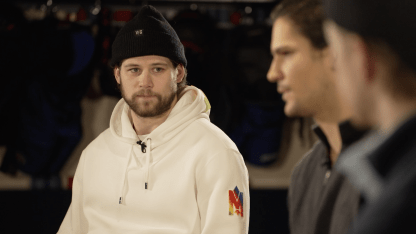Anderson: 'It's important to talk to people that you trust'
Josh Anderson, Johnathan Kovacevic and Michael Pezzetta recently discussed mental health

One in four Canadians have experienced high levels of anxiety.
Fifty-six percent of people struggling with mental health in this country are not getting the help that they need.
And an estimated 200 people attempt suicide every day.
With these numbers in mind, Josh Anderson, Johnathan Kovacevic and Michael Pezzetta recently sat down for an important conversation ahead of Hockey Talks Night at the Bell Centre.
Here are some highlights from the chat:
How do you personally take care of your own mental health?
JA: It's important to talk to people that you trust, family members and people that will be there for you every day who love you and support you. It's something that can be difficult to talk about, but letting out your emotions and being able to trust somebody with things that you're dealing with is good. It's important to express the way you feel because it'll be a lot of weight lifted off your shoulders.
JK:A lot of times, especially when I was younger, I would kind of run away from feeling those feelings because I thought they were uncomfortable to feel. Finding someone that you trust to talk to is a way that you can kind of work through your problems. I know in the past I would just ignore them or cover them up with whatever was going on that day, but those things build inside, so it's good to talk about them.
MP: A lot of times I struggle with allowing myself to be vulnerable to people and really explain how I'm feeling, so you try to find a circle of people that you trust and you feel comfortable around, like my parents or my girlfriend or my brother, that I can really open up to and tell how I'm feeling and really get things off my chest. A lot of times, even just saying it to somebody takes a lot of weight off your shoulders and you definitely feel a lot better afterwards.
Des t-shirts et des messages spéciaux étaient visibles ce matin pour souligner l'importance de la santé mentale.
— Canadiens Montréal (@CanadiensMTL) January 24, 2023
Special shirts and messages were on display this morning to highlight the importance of mental health.#GoHabsGo | #LeHockeyEnParle | #HockeyTalks pic.twitter.com/NRBIhiHdaE
What would you say to someone who appears to be struggling with mental health issues?
JK: If someone's struggling, I would kind of just explain to them or let them know that it's okay to be struggling, that they don't have to feel bad about struggling and that many people deal with different things. That's an important conversation to have just because I know in my life sometimes I'm dealing with anxiety or whatever it may be, and kind of building it up in my head. Just to know that having bad days is okay and we all go through that, it's an important thought to have.
MP: If I see or get a sense that maybe somebody is struggling, you just try to open a door for them to be able to open up to you and try to build that trust with that person so that they're able to open up to you. I don't think you can really force someone to say something that they don't want to say, but you can kind of be a safe spot, like 'Hey! How are you feeling?' or 'What's going on?' and then just build that relationship where they have that trust to open up.
The Habs discuss mental health
What steps can each of us take to help eliminate prejudice and mental health stigma?
MP: Given the platform that we have as hockey players and athletes, I think it's usually a space where you don't really speak up about how you're feeling, what's going on in your life, or that it's okay to speak about this - or even doing things like this discussion where we're saying, 'Hey, everyone's gone through these struggles, a lot of times we're going through these struggles, like we're not all these super humans that are doing all this stuff and we don't have problems.' Even athletes at the high level we're at have these problems as well. Getting that message out there opens the door to other people as well to say they're struggling, too. It's not always sunshine and rainbows. That would maybe open up for other people to open up about their problems as well.
What would you say to a younger version of yourself to prepare for the current journey you're on?
JA: We've come a long way with mental health awareness growing and everybody learning about it, but we still have a lot of work to do. Growing up, I didn't really know much about it until I got to a certain age and heard about people struggling. When you get to a certain age and you're dealing with more important things in life, it could be your job or school being so stressful, you want to try to have someone to talk to. Your family and friends are there to support you on a daily basis, so if you could just open up and not hold that in - because that's when it affects you the most, when you don't talk about it - you can find that person that you really trust and love and commit to it, I think you'll feel better just letting it out and having that weight off your shoulders.
JK:Being vulnerable can be uncomfortable, but it can definitely go a long way. When I was younger, I would look up to older people, older athletes, and think they have it all figured out, but the older I get, the more I realize that nobody's got it all figured out. That's okay. You don't have to be perfect. You're never going to have it figured out. We're always going to try and keep learning and growing through whatever life may throw at us, so just know that it's okay not to be perfect.
Why is it important to participate in a conversation like this?
JK: When I first came to Montreal, it was a tough time, a tough transition for me because my whole life kind of changed in the span of one day. About a month in, I was sitting there thinking - 'I'm in the NHL now, I'm playing for the Habs, this is the biggest dream realized I could ever have' - and yet for whatever reason, I was a little anxious. I was still struggling even though from the outside it seemed like it was something that was a childhood dream. This kind of talk is just something that I want to do as I keep getting older or more established. I want to show that it's okay to struggle and be a part of the community. It would be great if we could inspire others and just make one person's life a little bit better.
MP:My whole life has always been putting things on the back burner, just like work harder, suck it up, and I think as I got older, I started to realize that's not the best way to do things, always keeping everything inside and just kind of internalize it and push it to the side. I'm pushing myself to be more open and vocal about my mental health and what's going on in my life. If I can have a voice and speak up about how I'm feeling, maybe it'll inspire someone else to do the same.


















